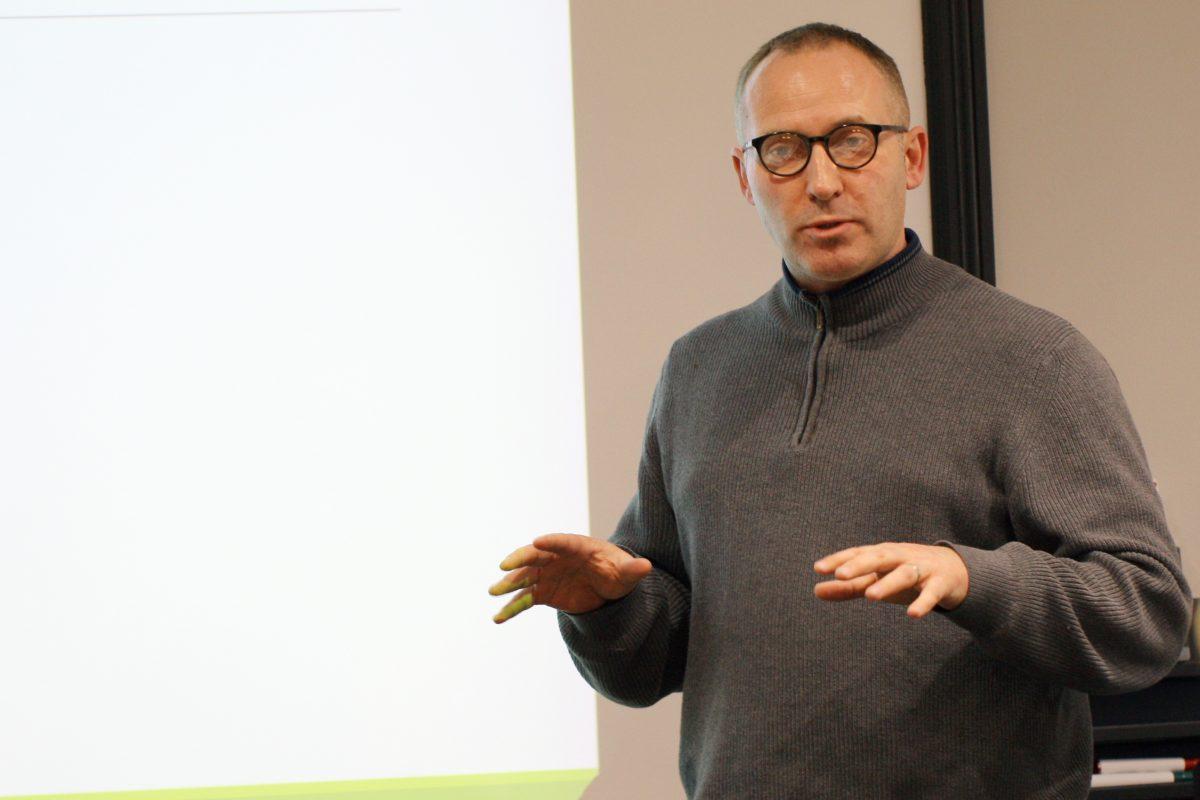
David Rieder gave a presentation about his upcoming book Suasive Iterations and how humanities and engineering can merge disciplines to create new experiences. Photo by Sasha Afanasyeva.
About 20 students and faculty members gathered Thursday evening in Caldwell Hall while David Rieder, an associate professor in English and co-director of the Circuit Research Studio from N.C. State, presented about how computer science combined with humanities can result in a new form of expression.
Rieder spoke about his book, titled Suasive Iterations, as well as the emphasis of his work and its relation to rhetoric. Rieder is an associate professor in English and co-director of the Circuit Research Studio at N.C. State.
Rieder worked on a project in which the Xbox Kinect gaming device was modified to display poetry in the shape of the person standing in front of it.
“Rhetoric can be described as a way of moving people, as a way of changing the way they think and feel,” Rieder said. “Traditionally it is done with language. What I am trying to do with rhetoric here is change the experience someone has with an object or within an immersive environment, and when that happens, it’s rhetoric.”
“It is the kind of work that will be supported in the new Circuit Research Studio, as well as among librarians on campus like Brendan O’Connell,” Reider said.
On Tuesday, the Circuit Research Studio opened at the Ricks Hall Annex in celebration of the new research space designed to bring digital media, engineering and the humanities together. Some attendees from the grand opening also attended Rieder’s presentation.
“It’s really interesting,” said Kate Maddalena, a graduate student in English who attended both events. “I think it’s important for students to know that the English department is doing stuff with computers and interpretative work with computer code. [Rieder] is at the edge of that and forging the ground that links computer science with studying language.”
In order to make a great number of his projects a reality, Rieder said he had to learn to program as well as learn how to use an open source microcontroller called Arduino.
“To do interesting work in what is now called the digital humanities, you really have to have numeracy and literacy, not one or the other,” Rieder said.
Rieder talked about how using sensors can be used to create new experiences that form links between the physical world and a virtual world, using the example of a body monitor called Fitbit that tracks physical activities, interprets data from the sensor and uploads it to the cloud in order to be accessed by the user’s phone.
“What we are dealing with are four techno-stases,” Rieder said. “Sensors and actuators, microcontrollers and processes, internet global communication protocols and cloud based servers, and programs in which large scale data processing and collection can be outsourced.”
Rieder also discussed his work with accelerometers and how they can be used as a form of rhetoric.
“The data coming out of those accelerometers could be the basis for any possible number of arguments, like to create an immersive computational experience of The Odyssey,” Rieder said. “As a variation of the theme, I could embed the sensors in wine bottles, like message in a bottle.”
The majority of the attendees were faculty members and graduate students. Of the faculty members who attended the presentation, most were from the English department.
“What I enjoyed the most about the talk was understanding how this was a fine demonstration of the traditional rhetorical ideas in respect to making the audience feel something and do something and behave in a certain way,” said John Morrillo, an associate professor in the English department.
“In this new paradigm of computing, these new sensors and computers are waiting to be used,” Rieder said.